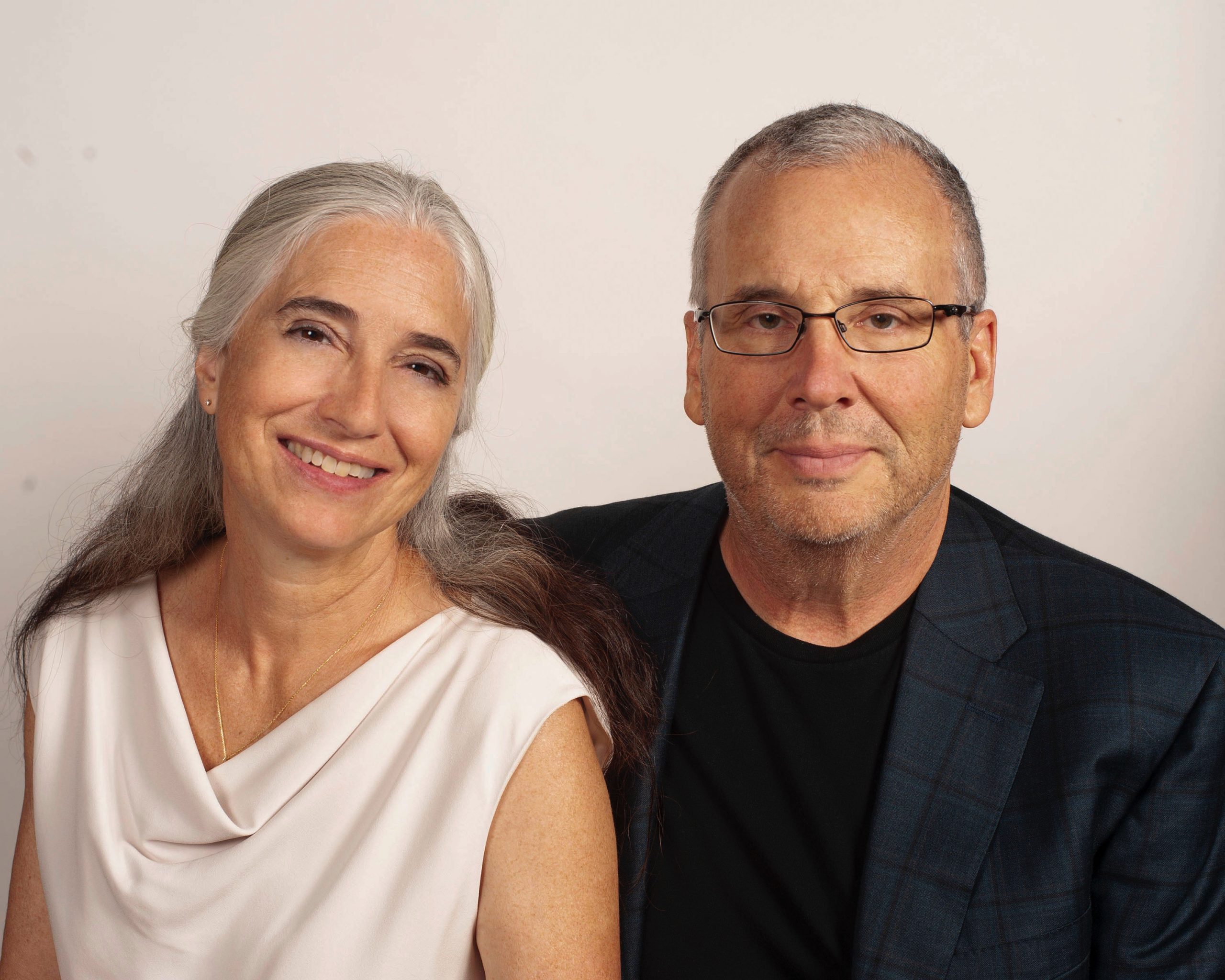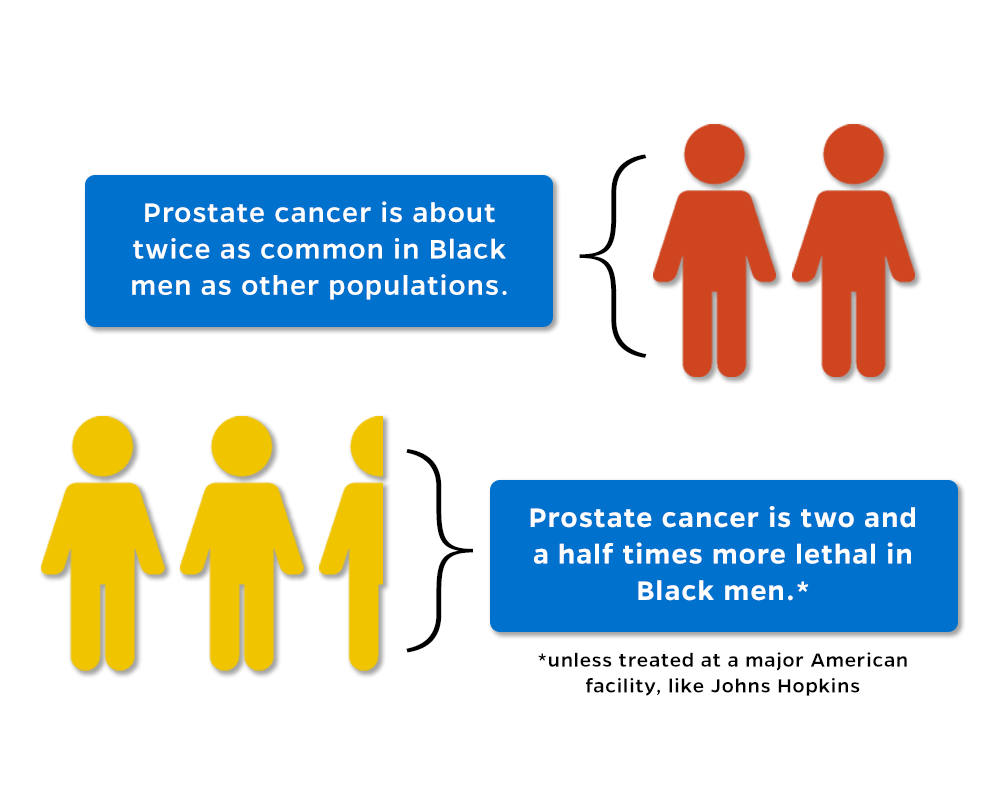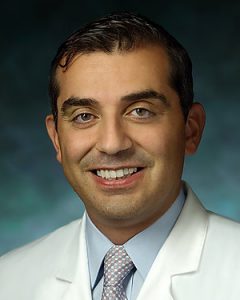Johns Hopkins UniversityEst. 1876
America’s First Research University
A new program at the Brady Urological Institute will combine research, education, and community partnership to advance the understanding and outcomes of prostate cancer in Black men.
Set in motion by a $5 million commitment from the Fredrick D. and Karen G. Schaufeld Family Foundation, the Schaufeld Program for Prostate Cancer in Black Men aims to reduce the impact of the disease in African American men, particularly in the Baltimore and Washington, D.C., areas.

“We fashioned and imagined a program that would be community-facing and serving, scientifically based, and focused on promoting education, all integrated around the clinical work we do in Baltimore City and in the National Capital Region,” says Mohamad Allaf, director of the Schaufeld Program. “It’s a targeted approach to partner with the community to close a gap in outcomes in a disease that afflicts one in eight Americans.
“Without partnering with philanthropists like Karen and Fred Schaufeld, the resources necessary to jumpstart a program like this do not exist,” he adds. “We as a society, not just as academicians, really depend on and are thankful for the generosity of those who have done well, are looking to give back, and are helping us impact change in a positive way in our communities.”
Fred and Karen Schaufeld were introduced to Allaf and his team at the Brady when Fred underwent his own treatment for prostate cancer. As he started to understand more about the disease, Fred says he was struck by its particular outcomes in Black men.
“Johns Hopkins as an institution is such a blessing for men of all races with prostate cancer throughout the world. But let’s face it, home base is here in Baltimore. This is an opportunity to increase this blessing to men who conveniently happen to be represented in this local community,” Fred says.
“When I was in college, my father died at a young age from prostate cancer, so we know how devastating this can be to a family,” he adds. “When we learned that statistically Black families suffer dramatically worse effects from aggressive prostate cancer, it became obvious we could show our gratitude in a focused and effective way. While we are specifically targeting improving the lot of Black men, and particularly those in the Baltimore and Washington areas, we realize this work can also improve the lot of white men or men of any race in any geography, and we want that too. We’re trying to create a better situation for everybody.”
Prostate cancer is about twice as common in Black men as other populations, and two and a half times more lethal. Access to care plays a major role in the heightened mortality rate, the program’s chief advisor, Otis Brawley, says.
“If they are treated at a major American facility, once we look at stage, race doesn’t matter. Yes, Black men are more likely to get the disease,” he explains. “But in the United States as a whole, Black men who are stage two have an increased risk of dying from prostate cancer when compared to white men who are stage two.”
Potential biological differences may also play a role in the disparity, says Tamara Lotan, the program’s co-director. Her lab studies molecular biomarkers — genetic changes that happen in the prostate tumor.
“We’re trying to better understand the contribution of both of those components. From a biological perspective, prostate cancer arising in men of African descent has been really under studied,” she says, adding that Hopkins has a significant number of archived prostate cancer specimens. “Having resources to carefully study these cases is a significant advancement on the research side of this program.”
The Schaufeld Program will also partner with departments across Hopkins to bolster the next generation of physicians and scientists. Post-baccalaureate students will work in labs to gain research experience, with the goal of better understanding prostate cancer in Black men. They’ll also be exposed to important questions around increasing the diversity of the types of patients studied, Lotan says.
“The educational component of this program will tap into an amazing resource of more diverse scientists and scientific trainees,” she adds.

For Allaf, the opportunity to partner with members of the Baltimore and D.C. communities is the program’s most exciting facet. That partnership won’t just facilitate greater access to prostate cancer prevention and treatment. It will also enable patients to have a better understanding of their diagnosis and make more informed decisions about their care.
Communication around treatment options can be challenging, particularly for patients without ready access to a primary care provider. The program’s community partnership will give providers the opportunity to determine how to best deliver complex information.
“Our goal is that — regardless of race, socioeconomic status, or geography of where they live — all men have the information they need so they feel empowered to make an informed decision about their own care,” says Dina Lansey, the program’s senior advisor. “Whether that is prostate screening or choosing the best cancer treatment option for them.”
Karen Schaufeld, who experienced the challenges of discussing prostate cancer firsthand following Fred’s diagnosis, echoes the ripple effect of clear and open communication.
“If we make sure that people are more comfortable talking about prostate cancer, they’ll be more aware,” she says. “They’ll take the time to focus on preventative care; they’ll take the time to get tested. It’s important to have a conversation and just say, ‘You’re at risk. Let’s make sure that you get the best possible outcome.’”
The Schaufeld Program, which launched in July, has the long-term goal of inspiring co-investors and attaining extramural funding from government and other sources to ensure all men have equal access to prostate cancer care.
“This program is an important step in understanding why prostate cancer is so common in Black men. The work will also take steps to improve health equity for this disease,” says Paul B. Rothman, dean of the Johns Hopkins School of Medicine and CEO of Johns Hopkins Medicine. “As we have seen during the pandemic, not everyone in this country has equal access to high-quality health care. We are working to remedy that, and this program is part of our effort.”
For more information on the Schaufeld Program, visit www.hopkinsmedicine.org/urology/schaufeldprogram.
Topics: Friends of Johns Hopkins Medicine, Johns Hopkins Medicine, Promote and Protect Health